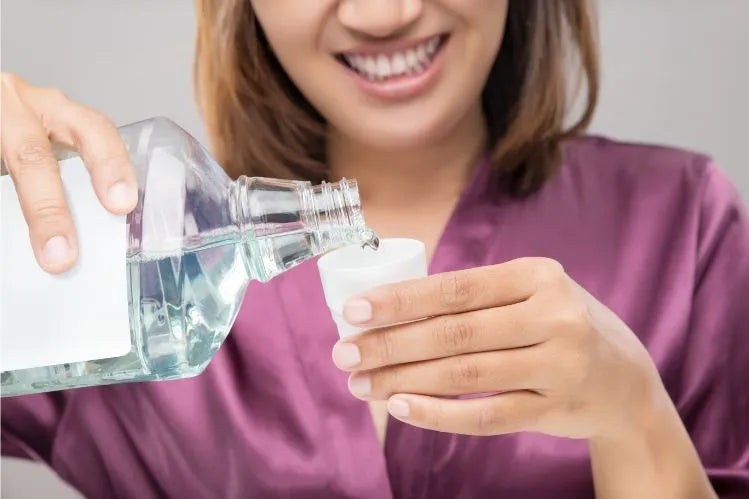
The Benefits of Using Mouthwash for Better Oral Hygiene:
Oral hygiene is an essential aspect of overall health, and maintaining good oral hygiene habits is crucial to preventing various dental problems. While brushing and flossing are the cornerstone of oral hygiene, using mouthwash can provide additional benefits that go beyond just freshening breath.
Mouthwash, also known as oral rinse, is a liquid solution used to rinse the mouth and is available in a variety of flavors and types. Some mouthwashes contain fluoride, an essential mineral for healthy teeth and gums, while others are designed to combat specific dental issues like plaque and gum disease.
Prevents Cavities:
Fluoride-containing mouthwashes can help prevent cavities by strengthening the enamel on teeth. Enamel is the outer layer of the tooth that protects it from decay. Fluoride helps to remineralize the enamel, making it more resistant to decay.
Reduces Plaque:
Plaque is a sticky film of bacteria that forms on teeth and can lead to tooth decay and gum disease. Using an antibacterial mouthwash can help reduce the amount of plaque in the mouth and prevent it from building up.
Fights Bad Breath:
Mouthwash can help freshen breath by killing the bacteria that cause bad breath. However, it's important to note that if bad breath persists, it could be a sign of an underlying dental or medical issue that requires further attention.
Soothes Mouth Sores:
Mouthwash can help soothe and reduce inflammation in the mouth caused by canker sores or other types of mouth sores.
Prevents Gum Disease:
Gum disease is a common oral health problem that can lead to tooth loss if left untreated. Using an antibacterial mouthwash can help prevent gum disease by killing the bacteria that cause it.
Choosing the Right Mouthwash
When selecting a mouthwash, it's important to choose one that meets your specific needs. For example, if you have sensitive teeth, you may want to choose a mouthwash designed for sensitive teeth. If you're looking to prevent cavities, choose a fluoride-containing mouthwash.
In addition to using mouthwash, it's important to maintain good oral hygiene habits, such as brushing twice a day and flossing daily. Regular visits to the dentist for cleanings and checkups can also help prevent dental problems and keep your mouth healthy.
Tips for Using Mouthwash
Read the label: Always read the label before using any mouthwash product. The label will provide important information on how to use the product correctly and any potential side effects to be aware of.
Measure the amount: Many mouthwash products come with a cap that can be used to measure the amount of mouthwash you need. It's important to use the recommended amount to ensure maximum effectiveness and avoid any potential side effects.
Don't swallow: Mouthwash is meant to be spit out, not swallowed. Swallowing mouthwash can be harmful, especially if it contains alcohol or other potentially harmful ingredients.
Use at the right time: While you can use mouthwash any time of day, it's best to use it after brushing and flossing to ensure that your mouth is clean and free of debris.
Wait to eat or drink: It's recommended to wait at least 30 minutes after using mouthwash before eating or drinking anything. This will give the mouthwash time to work and provide maximum benefits.
Store properly: Store your mouthwash product in a cool, dry place and away from direct sunlight. Follow the instructions on the label for proper storage and disposal of the product.
Conclusion
In conclusion, using mouthwash can be a beneficial addition to your oral hygiene routine. It can help prevent cavities, reduce plaque, freshen breath, soothe mouth sores, and prevent gum disease. However, it's important to choose a mouthwash that meets your specific needs and to maintain good oral hygiene habits to keep your mouth healthy.
FAQs
No, mouthwash is not a substitute for brushing and flossing. While mouthwash can provide additional benefits, it should be used in addition to regular brushing and flossing to maintain good oral hygiene.
Yes, you can use mouthwash every day as part of your oral hygiene routine. However, it's important to choose a mouthwash that meets your specific needs and to follow the instructions on the label.
Most mouthwash products recommend rinsing for 30 seconds to one minute. Follow the instructions on the label for best results.
Some people may experience a burning or tingling sensation in their mouth after using mouthwash. This is usually temporary and should subside quickly. However, if you experience any persistent side effects or discomfort, stop using the mouthwash and consult your dentist or healthcare provider.


 Australia
Australia New Zealand
New Zealand Malaysia
Malaysia English
English Portuguese
Portuguese English
English English
English English
English English
English English
English Canada
Canada